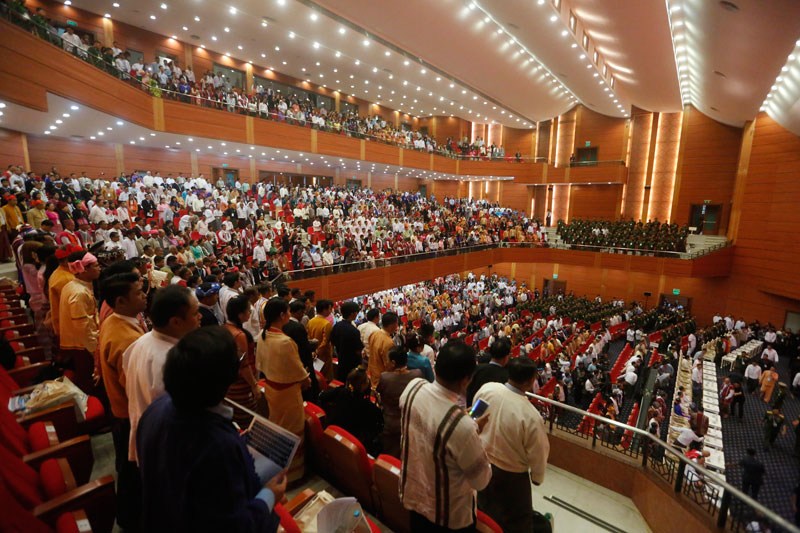Category:

General view of the third session of the 'Union Peace Conference - 21st century Panglong' in Naypyitaw, Myanmar, 11 July 2018. Photo: Hein Htet/EPA
United States Institute of Peace, a well-known US think-tank, released a report titled "China's Role in Myanmar's Internal Conflicts" on September 14 claiming that "China has set aside its stated adherence to the principle of non-interference to become more proactively and assertively involved in Myanmar's peace process." The report cast doubts on Beijing's role and motives in the national reconciliation and overall peace process in Myanmar.
The report recognizes China's role in the process of achieving peace in Myanmar, but makes a mistake in judging China's attitude and motivation in mediating Myanmar's domestic affairs. China has never abandoned the principle of non-interference in others' internal affairs but has considered it a prerequisite for its involvement in Myanmar's internal peace process. In recent years, China has been proactively seeking major-country diplomacy and offering views and solutions for regional and global affairs.
But meanwhile, Beijing sticks to the principle of non-interference in others' internal affairs. China's participation in the national reconciliation and internal peace process in Myanmar is actually based on respect for the will of the Southeast Asian country's government, military, and ethnic armed organizations in northern Myanmar.
The report ignores the major challenges that confront Myanmar's national reconciliation and blames China for not expecting a real peace in the foreseeable future. It claims that "genuine sustained peace also would weaken China's influence over ethnic nationalities, particularly along the border." It is the major goal of the US to wean Myanmar away from its dependence on China, create distance between the two nations and enhance Washington's strategic influence on Myanmar's internal affairs.
Compared with the US, Japan and EU countries which also hope to deepen their influence on Myanmar, China enjoys an advantage in actively participating in the peace process in Myanmar due to geographical proximity and Beijing's practical influence on both sides of the conflict.
There's also a pressing need for China to participate in the peace process in Myanmar.
On the one hand, Myanmar is crucial to China's peripheral security. Its peace and stability determines whether China can have a peaceful and stable peripheral security environment.
On the other, the situation in Myanmar has a profound impact on China's strategic interests in Myanmar as well as in the region. Border trade between China and Myanmar, a large amount of Chinese overseas investment in Myanmar, as well as the significance of Myanmar as a geopolitically important country in the implementation of Belt and Road initiative and Bangladesh-China-India-Myanmar (BCIM) Economic Corridor are all of importance to Beijing. Therefore, China is the country that most expects peace, stability and unity in Myanmar.
On account of its advantages, China has long played an active role in promoting peace talks to achieve national reconciliation and peace process in Myanmar on the basis of respecting the will of all parties within the country.
China has created favorable conditions for peaceful dialogue for parties involved in the conflict, participated in and promoted political talks between Nay Pyi Taw and ethnic armed organizations as a third party, sent special envoys to attend meetings held by ethnic minorities. The Chinese government and local authorities are also promoting humanitarian relief work in areas bordering Myanmar, striving to maintain peace and order on the frontier. China's efforts to promote peace talks are an important external factor for the steady progress in achieving national reconciliation and domestic peace in Myanmar, and have been greatly appreciated by various parties in Myanmar and its State Counselor Aung San Suu Kyi.
The peace process in Myanmar still has a long way to go and faces a series of challenges, among which the to-be-resolved national conflict within the country is the most prominent one. There are still technical and structural contradictions between the Myanmar government, military and ethnic armed groups over the cease-fire and peace talks. These contradictions are the continuation of the civil war of more than half a century and endless national struggle in Myanmar. Obviously, this is the biggest challenge for the dream of peace proposed in the Panglong Peace Conference, and to overcome this challenge, the Myanmar government, military and ethnic armed groups need more political wisdom and patience.
The author is director of the College of ASEAN Studies at Guangxi University for Nationalities and a research fellow with The Charhar Institute. opinion@globaltimes.com.cn
Courtesy Global Times